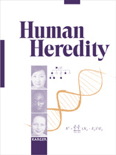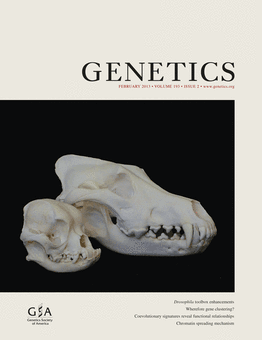
HUMAN HEREDITY
metrics 2024
Decoding the Blueprint of Human Heredity
Introduction
HUMAN HEREDITY is a peer-reviewed journal published by KARGER, dedicated to advancing the understanding of genetics and inherited traits in human populations. Established in 1950, this journal has become a vital resource for researchers, professionals, and students in the fields of genetics and clinical genetics, currently categorized in the third quartile (Q3) for both general and clinical genetics as of 2023. With an ISSN of 0001-5652, HUMAN HEREDITY provides rigorous academic content that analyzes heredity patterns and genetic variations, aiming to illuminate the complexities of human genetic inheritance. Although it does not operate on an open access model, the journal offers a comprehensive collection of studies and insights that are crucial for genetic research and clinical applications. Situated in Basel, Switzerland, HUMAN HEREDITY contributes to the global dialogue in genetics, making it an essential platform for those seeking to enrich their understanding of human heredity in a rapidly evolving scientific landscape.
Metrics 2024
 0.48
0.48 1.10
1.10 1.40
1.40 66
66Metrics History
Rank 2024
Scopus
IF (Web Of Science)
JCI (Web Of Science)
Quartile History
Similar Journals

Human Genomics
Advancing the Frontiers of Genomic ScienceHuman Genomics, published by BMC, is a leading open-access journal dedicated to advancing the field of genomics and its applications in health and disease. Since its inception in 2003, the journal has provided a vital platform for researchers to disseminate groundbreaking findings related to genetic research, contributing significantly to areas such as Drug Discovery, Genetics, Molecular Biology, and Molecular Medicine, as reflected in its Q1 and Q2 quartile rankings throughout 2023. With an ISSN of 1473-9542 and an E-ISSN of 1479-7364, Human Genomics not only delivers high-quality, peer-reviewed research but also ensures accessibility to a broader audience, empowering professionals, students, and academics to stay at the forefront of genomic science. Through its rigorous editorial standards and impactful publications, the journal fosters a collaborative environment for innovative research across the globe from its base in the United Kingdom. By promoting open access since its launch, Human Genomics continues to enhance the visibility and impact of genetic studies, making it an essential resource for anyone involved in the rapidly evolving field of human genomics.

ANNALS OF HUMAN BIOLOGY
Advancing Knowledge at the Intersection of Biology and HealthANNALS OF HUMAN BIOLOGY is a distinguished academic journal published by Taylor & Francis Ltd that focuses on the intersection of human biology and health sciences. With an ISSN of 0301-4460 and an E-ISSN of 1464-5033, this journal has been a pivotal resource for researchers and practitioners since its inception in 1974. Covering critical domains such as Aging, Epidemiology, Genetics, Physiology, and Public Health, it exemplifies an interdisciplinary approach that enhances our understanding of human biological variation and its implications for health and disease. While it currently does not offer Open Access, the journal maintains a respectable standing in its field with notable rankings in Scopus, reflecting its contributions to scientific knowledge. Its commitment to high-quality research and comprehensive review makes it an essential platform for scholars, healthcare professionals, and students seeking to explore the biological underpinnings of human health.

GENETICS
Leading the Charge in Genetic Research and DiscoveryGENETICS, published by the Genetics Society of America, stands as a preeminent journal in the field of genetics, with a keen focus on advancing the understanding of genetic principles and their implications across various biological systems. Since its inception in 1945, the journal has played a pivotal role in disseminating groundbreaking research, maintaining a Q1 ranking in the genetics category as of 2023, positioning it among the top tier of academic publications. While access to the journal is not open, it continues to attract a global readership of researchers, professionals, and students eager to engage with high-quality, peer-reviewed articles that span both classical and contemporary genetics. With its publication history covering critical decades from 1945 to 2024, GENETICS is not just a repository of scientific knowledge but a vibrant forum for the exchange of ideas that drive the field forward. The journal’s commitment to excellence is demonstrated by its strategic coverage of pertinent topics, assuring its relevance for future generations of scholars.

HUMAN GENETICS
Exploring the genetic blueprint of humanity.HUMAN GENETICS, published by SPRINGER, stands as a cornerstone journal in the field of genetics, offering a wealth of research insights since its inception in 1964. Hailing from Germany, this esteemed journal boasts an impressive Q1 ranking in both Genetics and Clinical Genetics, marking it among the top quartile of journals in these categories for 2023. With a notable Scopus rank of #7 in Clinical Genetics and a percentile ranking of 93, HUMAN GENETICS attracts significant attention from researchers and professionals dedicated to advancing our understanding of genetic influences on human health and disease. Although it does not currently offer Open Access options, the journal provides a critical platform for scholarly communication, aimed at disseminating groundbreaking findings in genetics and biotechnology. As the field evolves, HUMAN GENETICS continues to play an instrumental role in bridging the gap between laboratory research and clinical application, making it an essential resource for students and seasoned researchers alike.

Frontiers in Genetics
Advancing the Frontiers of Genetic KnowledgeFrontiers in Genetics is a premier academic journal dedicated to advancing the field of genetics through high-quality, peer-reviewed research. Published by FRONTIERS MEDIA SA in Switzerland since 2010, this Open Access journal provides a platform for researchers and practitioners to disseminate innovative findings across various subfields, including clinical genetics and molecular medicine. With a notable emphasis on interdisciplinary approaches, the journal holds a strong position in the academic landscape, achieving Q2 rankings in key categories such as Genetics and Molecular Medicine in 2023. Not only does Frontiers in Genetics contribute to the scholarly dialogue by publishing impactful studies, but it also promotes accessibility to vital research, ensuring that knowledge is available to a global audience. This journal is a vital resource for researchers, professionals, and students looking to stay at the forefront of genetic discoveries and their applications, reflective of its engagement with contemporary challenges in genetics and healthcare.

ANNALS OF HUMAN GENETICS
Fostering Collaboration for Genetic BreakthroughsANNALS OF HUMAN GENETICS is a distinguished peer-reviewed journal extensively covering the field of genetics, published by Wiley. Established in 1954 and extending its influence into 2024, this journal features comprehensive research articles, reviews, and case studies aimed at advancing our understanding of human genetic conditions and their implications on health. With its ISSN number 0003-4800 and E-ISSN 1469-1809, the journal has carved a prominent niche within the academic community, currently ranking in the third quartile in both genetic and clinical genetics categories (Q3, 2023). Its Scopus rankings reflect its credibility, placing it #54 out of 99 in clinical genetics. Though it is not open access, it remains an essential resource for researchers and practitioners seeking to explore the latest findings and methodologies in genetics, serving as a critical platform for knowledge dissemination and dialogue within the scientific community. As we delve deeper into the complexities of our genetic makeup, the ANNALS OF HUMAN GENETICS continues to play a vital role in fostering innovation and collaboration in this ever-evolving field.

Human Genome Variation
Bridging Research and Clinical ApplicationsHuman Genome Variation, published by SpringerNature, is an esteemed open access journal dedicated to the field of genetic research and exploration. Since its inception in 2014, the journal has been at the forefront of advancing our understanding of human genome diversity and its implications in health and disease. With an E-ISSN of 2054-345X, it features a diverse array of studies that encompass biochemistry, genetics, and molecular biology, making it an invaluable resource for researchers and professionals alike. The journal holds a Q3 ranking in both biochemistry and genetics, and a Q4 ranking in molecular biology, highlighting its growing influence within these disciplines. As the landscape of genomics continues to evolve, Human Genome Variation serves as a platform for the dissemination of high-quality research, fostering collaboration and innovation within the scientific community. Researchers and academics are invited to contribute to this pivotal journal, which not only provides open access to its content since 2014 but also aims to bridge the gap between basic research and clinical applications in genetics.

Human Genetics and Genomics Advances
Unlocking the Secrets of Human GenomicsHuman Genetics and Genomics Advances is a premier academic journal published by Elsevier, dedicated to the field of human genetics and genomic medicine. With an ISSN of 2666-2477, this journal has quickly established itself as a leading platform for disseminating cutting-edge research from its inception in 2020. Featured prominently in Q1 categories for both Clinical Genetics and Molecular Medicine as of 2023, it ranks favorably among its peers, reflected in its Scopus rankings. The journal not only offers valuable insights into the latest advancements and applications in genetics but also facilitates open dialogue among researchers, clinicians, and students. As an open access publication, it ensures that groundbreaking findings in genetics are readily accessible to a global audience, promoting knowledge sharing and collaboration. Human Genetics and Genomics Advances continues to be instrumental in moving the field forward, providing a vital resource for those at the forefront of genetic and genomic research.

NATURE GENETICS
Elevating Genetic Science to New HeightsNature Genetics is a premier journal in the field of genetics published by NATURE PORTFOLIO, renowned for its impactful research and significant contributions to the understanding of genetic mechanisms and their implications for human health. Since its establishment in 1992, the journal has continually maintained a strong reputation, evidenced by its impressive Q1 ranking in the Genetics category and a commendable Scopus ranking of #4 out of 347 in Genetics, placing it in the 98th percentile. Although it does not currently offer Open Access options, Nature Genetics remains a critical resource for researchers and practitioners, providing cutting-edge studies and papers that drive advancements in both fundamental and applied genetic research. With a global readership and contributions from leading scientists around the world, this journal is a vital platform for disseminating innovative findings and fostering discussions at the frontier of genetics.

Egyptian Journal of Medical Human Genetics
Innovating genetic research for better healthcare solutions.The Egyptian Journal of Medical Human Genetics is a distinguished Open Access journal published by SPRINGER NATURE, dedicated to advancing the field of medical human genetics. With an ISSN of 1110-8630 and an E-ISSN of 2090-2441, this journal serves as a vital platform for researchers, professionals, and students who are committed to the exploration of genetic implications on human health. Since its inception in 2010, it has become a growing repository of knowledge, significantly contributing to the discourse in clinical genetics, despite currently being ranked in the Q4 quartile of its category in 2023. The journal embraces an open access model, ensuring widespread visibility and accessibility of published research, thereby fostering collaboration and innovation in the field. The journal is not only aimed at disseminating findings but also at encouraging the dialogue around genetic research developments, making it an essential resource for anyone interested in the nuances of genetics and its impact on medicine.